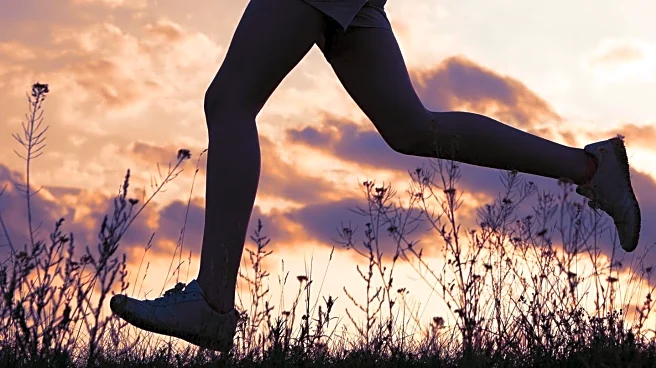What's Happening?
A recent study led by Professor Jan de Jonge from Eindhoven University of Technology has revealed that poor sleep quality significantly increases the risk of injury among recreational runners. The research,
published on November 11, 2025, examined sleep patterns and their impact on physical vulnerability. It found that runners who experienced difficulties in falling asleep, frequent awakenings, or rarely felt rested were more prone to injuries. The study emphasizes the importance of both sleep duration and quality, suggesting that consistent sleep schedules and feeling well-rested can reduce injury risks. Experts recommend seven to nine hours of sleep per night, with additional rest for athletes to enhance recovery.
Why It's Important?
The findings underscore the critical role of sleep in sports recovery and injury prevention, particularly for recreational runners who face substantial injury risks. With up to 90% of runners experiencing injuries, the study highlights the potential for sleep management to reduce medical costs and improve performance. By recognizing sleep as a vital recovery tool, athletes and sports organizations can implement strategies to enhance sleep quality, thereby reducing injury rates and associated economic losses. This research could influence public health policies and sports training programs, promoting better sleep practices as a preventive measure.
What's Next?
The study suggests that improving sleep quality could become a key focus for sports trainers and healthcare providers aiming to reduce injury rates. Future research may explore specific interventions to enhance sleep among athletes, potentially leading to new guidelines for sports recovery. Additionally, sports organizations might consider incorporating sleep assessments into training regimens to identify athletes at risk of injury. As awareness of sleep's impact on physical health grows, there may be increased investment in sleep-related technologies and therapies to support athletes' well-being.
Beyond the Headlines
The study opens discussions on the broader implications of sleep in overall health and wellness, beyond sports. It highlights the need for a cultural shift towards prioritizing sleep as a fundamental aspect of health, potentially influencing workplace policies and educational programs. The research also raises ethical considerations regarding the pressure on athletes to perform despite inadequate rest, prompting a reevaluation of training practices and athlete support systems.









